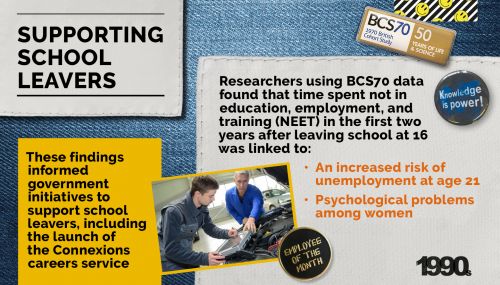
- Our studies
- Our research
- Publications and resources
- Data access and training
- About
- News
- Events
- Get in touch
- Join our mailing list


Findings from the 1970 British Cohort Study have highlighted how periods of being out of education, employment or training after leaving school can impact on different aspects of young people’s lives. This important evidence helped make the case for a raft of government measures to better support school leavers as they moved into the next stage of their lives.
At age 21, a representative 10% sample of BCS70 cohort members took part in a special sub study. The first time any of the cohort had been surveyed since age 16, this was an important opportunity to find out what had been happening in their lives since coming to the end of their compulsory education.
The study found that between ages 16 and 18, around 1 in 10 of the cohort had experienced periods of being not in education, employment or training (NEET) totalling six months or more.
Researchers analysing the study data found that young people who had no qualifications were six times as likely to have been NEET in the two years after leaving school as those with qualifications at O level or above. Male cohort members were at more risk of experiencing periods of NEET if their parents hadn’t read to them as children and if they had grown up in the inner city or on a council estate. Female cohort members were more likely to have been NEET if their parents hadn’t shown an interest in their education and if they had experienced poverty growing up.
The researchers examined how cohort members were faring in life at age 21. They compared the experiences of those who had spent periods out of work, education and training between ages 16 and 18 with those who had not. For men, the consequences of being NEET in adolescence were mainly linked to future employment prospects; they were over three times as likely to be NEET at 21 if they had been NEET previously, between ages 16 and 18. Women who had been NEET as teenagers were over five times as likely to be NEET at age 21, with many having become young mothers. Women were also greater risk of psychological difficulties at age 21, including feelings of dissatisfaction with life and of a lack of a sense of control, if they had been NEET in the two years after leaving school.
These findings informed the influential 1999 Social Exclusion Unit report, Bridging the Gap, produced at the request of Prime Minister Tony Blair, which paved the way for the launch of the Connexions careers service for young people at the start of a new millennium.
“…we are now clear about the goal – higher standards of education for all, support for those who need it most, and an end to a situation in which thousands of young people are not given the chance to make a better life for themselves and a bigger contribution to society.” Tony Blair, Bridging the Gap, 1999
Read the research: Social Exclusion and the Transition from School to Work: The Case of Young People Not in Education, Employment, or Training (NEET)
Read the government report: Bridging the Gap, New opportunities for 16-18 year olds not in education, employment or training
Ryan Bradshaw
Senior Communications Officer
Phone: 020 7612 6516
Email: r.bradshaw@ucl.ac.uk